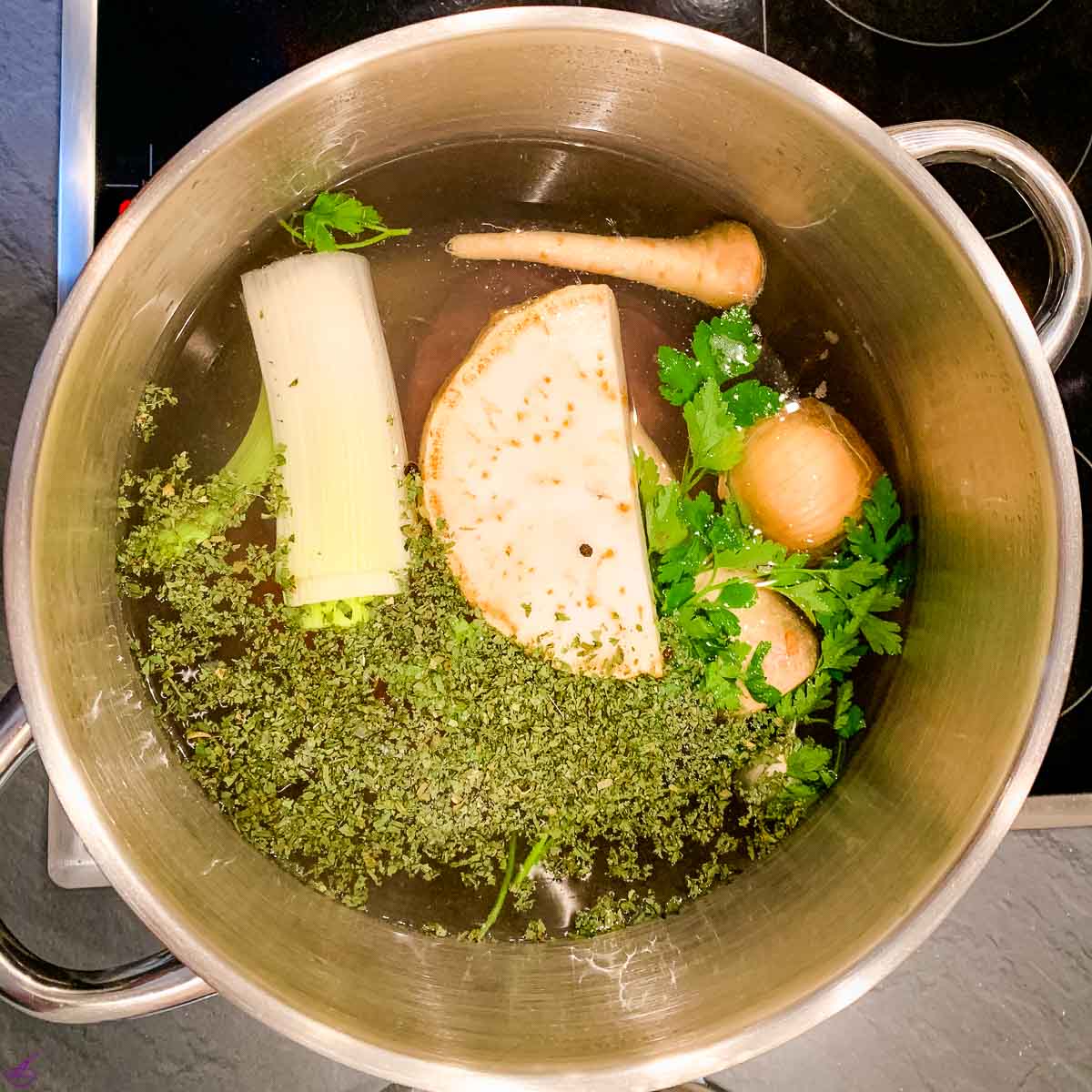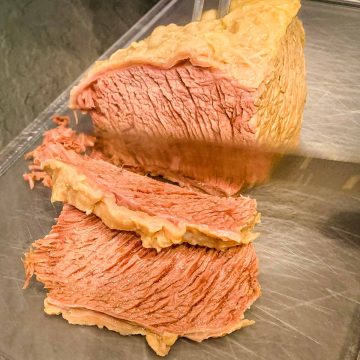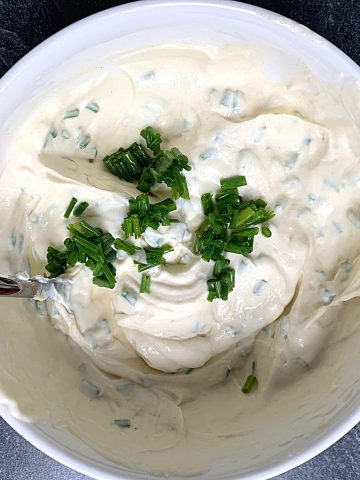Today I would like to introduce you to one of my favorite dishes from my homeland: Tafelspitz, a national dish from Austria.
Learn how to easily prepare this delicacy in your kitchen and an excellent pick for a Christmas menu main course.

If you're visiting Vienna and want to eat the best Tafelspitz, you should pay a visit to Plachutta in Wollzeile.
Anyway, Tafelspitz is certainly a Viennese “delicacy” suited to special occasions…for dinner parties, having family around, or a holiday celebration. It's even the flagship dish on the menus of some of Vienna's more upmarket restaurants, such as Plachutta on the Wollzeile (Incidentally, Tafelspitz is also the name of the specific meat joint used, cut from the rump, with a characteristic layer of fat on one side. If there's no fat, it's not Tafelspitz.)
You boil the meat in simmering water until very soft and tender, along with soup greens and/or soup cubes. People typically use the leftover broth as a soup before the meat course.
Jump to:
🥘 Ingredients
- Mirepoix (mixed vegetables for soup: carrots, parsley, celery stalk, and leek)
- Tafelspitz (Tafelspitz is part of the beef hindquarter. It forms the flat end of the beef rump, tapering to the tail. The meat is medium to long fibrous and therefore suitable for simmering, cooking, and braising.)
- Salt
- Peppercorns
- Lovage
- Stock Cube
- Garlic cloves
- Onion
See the recipe card for quantities.

🍽 Equipment
- Large Soup Pot with at least 7-quart capacity
- Cutting Board
- Kitchen knife
- Strainer
🔪 Instructions
Fill a large soup pot ⅔ full of water. Add all the other ingredients (except the meat) and bring the water to a boil.
The meat must be added to the pot only when the water boils; this is because you want to keep the flavor inside the meat and not boil it out.

Mirepoix (mixed vegetables for soup: carrots, parsley, celery stalk, and leek)

Cook the Tafelspitz for 2,5 hours.
In fact, this is precisely the opposite of boiling a classical beef broth here. When making beef soup, that's what you want.
To get every flavor out of the meat into the soup. But with Tafelspitz, you want the beef to retain its incredible flavor!
Once the water boils, add the meat and let it cook for 2.5 hours. Put the lid of the pot at an angle during this process. Then strain the soup to separate it from the greens.
Place the cooked Tafelspitz on a cutting board and cut it into finger-thick slices.




If you don't want to discard the carrots, set them aside and slice them. Then, return the sliced carrots to the soup.
Now you can serve the soup with an addition of your choice. (I opted for a noodle soup here).
You can also use frittatas, liver dumplings, semolina gnocchi, here. Whatever you fancy. Afterward, present the Viennese Tafelspitz with roasted potatoes, apple horseradish, and chive sauce.
🇦🇹 If you are looking for more authentic Austrian recipes, you can find them in our Austrian recipe category. 🇦🇹
💭 Top tip
Traditional Accompaniments with Austrian Boiled Beef
When ordering Tafelspitz in a restaurant in Austria, you traditionally get the meat in the soup served in a small soup pot. Kartoffelschmarrn (roasted potatoes) and sauces (apple horseradish and chive sauce) separately. In some cases, instead of roasted potatoes, creamed spinach is served. You can choose the beef bouillon garnish in advance. In most cases: noodles, liver dumplings, or frittatas.
🙋🏻 FAQ
Vienna's best for boiled beef at Plachutta Wollzeile! I can highly recommend Plachutta to everyone!
Erdäpfelschmarrn (roasted potatoes), Chive Sauce, Apple Horseradish Sauce
Tafelspitz is part of the beef hindquarter. It forms the flat end of the beef rump, tapering to the tail. The meat is medium to long fibrous and therefore suitable for simmering, cooking, and braising.
Have fun cooking and enjoying this traditional Viennese delicacy! Let me know how you liked it!

Tafelspitz is part of the beef hindquarter
How long can you keep cooked beef?
USDA recommends using cooked beef within 3 to 4 days, kept refrigerated (40°F or less). Refrigeration slows but does not stop bacterial growth. USDA recommends using cooked leftovers within 3 to 4 days.
There are two different families of bacteria: pathogenic bacteria, the kind that cause foodborne illness, and spoilage bacteria, the kind of bacteria that cause foods to deteriorate and develop unpleasant odors, tastes, and textures.
Pathogenic bacteria can grow rapidly in the "Danger Zone," the temperature range between 40°F and 140°F. Because they do not generally affect the taste, smell, or appearance of a food, one cannot tell that a pathogen is present.
Spoilage bacteria can grow at cold temperatures, such as in the refrigerator. Eventually they cause food to develop off or bad tastes and smells. Most people would not choose to eat spoiled food, but if they did, they probably would not get sick. However, some pathogenic bacteria such as Listeria monocytogenes (Lm) thrive at cold temperatures, and if present, will grow in the refrigerator and could cause illness. Microbial spoilage results from bacteria, molds, and yeast.
Though spoilage of food is mostly an issue of quality, it is also a matter of food safety. Of course never taste foods to determine safety.
The Danger Zone is the temperature range between 41°F and 140°F in which bacteria can grow rapidly. To keep food out of the Danger Zone, keep cold food cold, at or below 40°F , and hot food hot, at or above 140°F. USDA recommends following the FOUR steps to Food Safety (Clean, Separate, Cook, and Chill) to prevent food spoilage and reduce your risk of foodborne illness.
Provide a short description of the article. The title appears in the article and in search results.
Source: ask.usda.gov
📖 Recipe

Tafelspitz - Austrian Prime Boiled Beef
Ingredients
- 1 bunch Mirepoix
- 1.3 lb Tafelspitz Tafelspitz is part of the beef hindquarter. It forms the flat end of the beef rump, tapering to the tail.
- 1 teaspoon salt
- 8 pcs peppercorns
- 1 teaspoon lovage
- 1 stock cube
- 1-2 cloves garlic
- ¼ Onion
Instructions
- Fill a large soup pot ⅔ full with water.
- Add all the other ingredients (except the meat) and bring the water to a boil.1 bunch Mirepoix, 1 teaspoon salt, 8 pcs peppercorns, 1 teaspoon lovage, 1 stock cube, 1-2 cloves garlic, ¼ Onion
- Once the water boils, add the meat and let it cook for 2.5 hours. Put the lid of the pot at an angle during this process.1.3 lb Tafelspitz
- After 2.5 hours strain the soup to separate it from the greens.
- Place the cooked Tafelspitz on a cutting board and slice it into finger-thick slices.
Notes
Use the cooked soup right away as an appetizer.
Now you can serve the soup with an addition of your choice. (I opted for a noodle soup here). You can also use frittatas, liver dumplings, semolina gnocchi, here. Whatever you fancy.What to serve with Tafelspitz?
- Erdäpfelschmarrn (roasted potatoes)
- Chive Sauce
- Apple Horseradish Sauce
Nutrition values are estimates only, using online calculators. Please verify using your own data.

⛑️ Food Safety
- Cook to a minimum temperature of 165 °F (74 °C)
- Do not use the same utensils on cooked food, that previously touched raw meat
- Wash hands after touching raw meat
- Don't leave food sitting out at room temperature for extended periods
- Never leave cooking food unattended
- Use oils with high smoking point to avoid harmful compounds
- Always have good ventilation when using a gas stove
For further information, check Safe Food Handling - FDA.

























Elizabeth Emery says
I love learning about traditional Austrian dishes! Makes me nostalgic for the days when we could travel. 🙂
Nora says
The time to travel will hopefully come again soon! Then nothing will stand in the way of a visit! 🙂
Giangi Townsend says
I am in love with this dish since my trip to Vienna and enjoying it at Plachutta. Love that I can make it home and cannot wait to get the cut of beef and have it at home. Loves Austria and cannot wait to visit again. Thank you for bringing some fond memories of a great family trip back <3
Nora says
That is so great to hear! <3
Kris says
This sounds amazing. I can’t wait to try it. I’ve never made anything like so I’m looking forward to learning!
Nora says
Thank you! Tell me how you liked it!
Gabriela Herrera says
I love that I never leave your site without learning something new and this recipe did not dissapoint.
Nora says
Thank you so much! It's so wonderful to hear that!
Emily Flint says
This does look like the perfect meal for the holidays! I'm also interested in that chive sauce so I will be on the lookout for that on your site 🙂
Nora says
Thank you so much! Yeah, the chive sauce recipe will be out in a week or two. 🙂